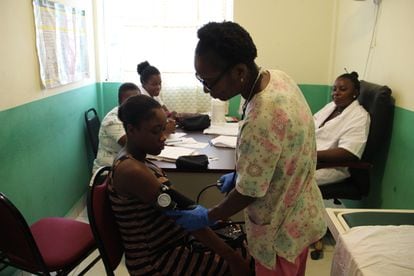Covid-19 put in check the health systems in Latin America and the Caribbean, which already had deficiencies before the pandemic. The climate crisis, although slower and less scandalous, is not far behind and also puts the response capacity of health systems at risk.
The World Health Organization notes that, in the coming decades, an additional 250,000,<> deaths per year due to climate-related diseases will occur worldwide. It is no small concern for Latin America and the Caribbean, a region where accelerating climate change is increasing the frequency and intensity of droughts, floods and where fires are becoming increasingly damaging.
Health systems in the countries of the region need to prepare themselves to face the challenges posed by climate change and turn those challenges into an opportunity for sustainable development. Let's see how.
Climate change and a healthy population
More CO2 emissions translate into more respiratory and cardiopulmonary diseases; Deaths due to heat waves have increased and high temperatures added to changes in the pattern of rainfall intensify epidemics of dengue, zika or malaria, among others; It also causes crop failures, which aggravates food security. This is a short list, but the list is much broader.
In Latin America and the Caribbean, annual deaths of people over 65 attributable to heat exposure increased on average by almost 240% compared to the period 2000-2004 with that of 2017-2021, according to the report Health at a Glance: Latin America and the Caribbean 2023, prepared by the World Bank and the Organization for Economic Cooperation and Development (OECD).
Between 2012 and 2021, the basic reproduction number (R0) of dengue in the region increased between 0.32 and 0.46, according to the report, and does not appear to be receding.
The World Bank has supported infrastructure improvements in more than 180 health facilities. Photo: World Bank
The alarms went off in Argentina when, in mid-April, after the warmest summer that country has had since records are kept, more than 56,000 cases of dengue and 48 deaths due to this disease were reported. According to the latest report, at the beginning of May, there were more than 100,000 infections and 59 deaths. Although the figure is declining, it was the largest outbreak of the disease in the history of Argentina.
This year also saw the highest number of dengue cases in Peru. Bolivia had the highest peak of the disease in the last 15 years. In 2022, Brazil broke its record with more than two million cases.
Prevention is better
Despite health being so vulnerable to climate change, only four countries have comprehensive national health and climate plans. And of the 25 countries that participated in WHO's 2021 health and climate change survey, only seven have formal vulnerability and adaptation assessments, critical to having the data to design plans to build climate-resilient health systems.
The study also highlights that, although early warning systems related to climate risks and health are key, only four of 23 countries in the region warn in time about heat-related diseases; while only six countries report that they have early warning systems related to vector-borne diseases, despite recurrent epidemics of mosquito-borne diseases in the region.
Experts point out that two major remedies to build resilience in health systems to the climate crisis are to achieve more solid and innovative mechanisms of international and national financing for climate change and health projects and to strengthen the interconnected work between sectors, both at the national and local levels based on:
- Develop health and climate change plans.
- Generate surveillance and early warning systems for climate-related diseases.
- Integrate public health and climate change systems that make it easy to communicate with health workers and other key actors at the time of an emergency.
- Train medical personnel on health and climate change issues (training that is still scarce).
- Ensure the continuous provision of services.
Making the infrastructure of health centers more resilient is also another challenge facing the region: seven out of 10 hospitals in Latin America and the Caribbean are in areas vulnerable to natural hazards, according to the Pan American Health Organization. Hospitals need to be able to continue functioning, despite climate-related hazards. For them, it is necessary to invest in adaptation measures.
Photo: World Bank
Climate-smart hospitals
The World Bank's report Building Resilient Health Systems in Latin America and the Caribbean mentions that another of the great challenges linking health with climate change is reducing the carbon footprint of medical centers.
Taking a climate-smart approach to reducing CO2 emissions includes efforts to promote green solutions in healthcare facilities. Some of these alternatives are the adoption of sustainable cooling measures in health infrastructure using, for example, solar energy; that there are guidelines for water use; ensure the procurement of environmentally friendly equipment and products (mercury-free, for example) and also develop regulations for waste management.
The report refers to a PAHO methodology, called Smart Hospitals, to evaluate and improve health care infrastructure in terms of structural and operational safety. Some Caribbean countries are working with this methodology and there are success stories on the islands of Saint Kitts and Nevis and the island of Saint Vincent.
Implement these great remedies so that Health Systems in Latin America and the Caribbean merit the action of international organizations, governments, private sector and civil society.
Marjorie Delgado Aguirre is a communications consultant for Latin America and the Caribbean at the World Bank.

